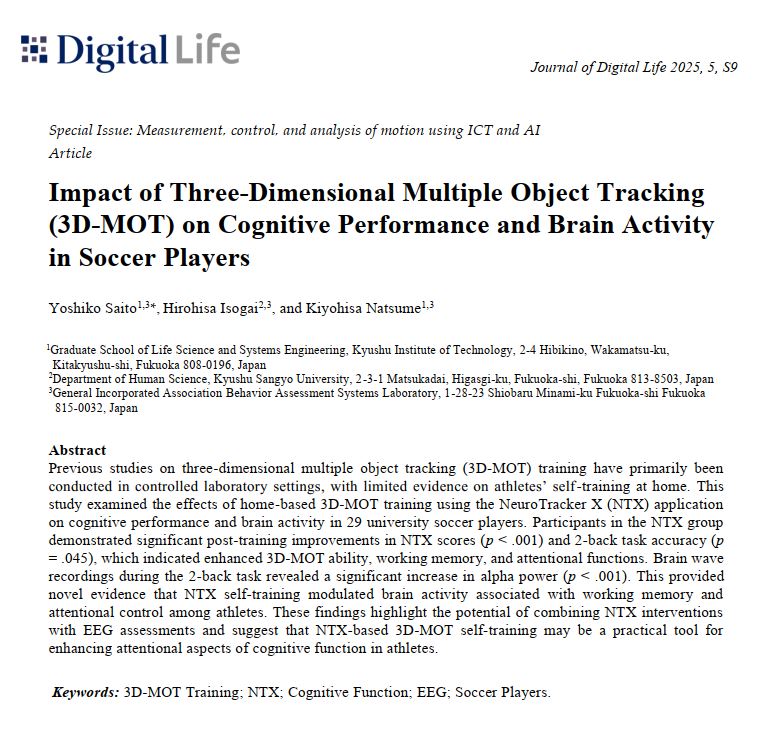Welcome to the Research and Strategy Services at in today's fast-paced.


With over 100 independently published papers to date, NeuroTracker baselines have been shown to be a cognitive predicter of human performance across domains such as professional sports, Esports, aviation, driving, academic learning and surgery skill. Now, new research has been published showing that NeuroTracker measures correlate strongly with the daily performance of business traders - the first study of its kind. Here we will highlight the key findings.

The science of neuroeconomics has shown that trading is a complex business skill which imposes continual demands on high-pressure decision-making, amid many variables and uncertainties. Additionally, ‘limited attention theory' in finance literature suggests that there are significant constraints on effective trader performance, given the multiple streams of information they need to handle in short periods of time. To date little research has examined the relationship between these cognitive capacities and the real-world performance of traders.
Neuroscientists at the Faubert Lab (University of Montreal), who published the new study, cited the growing evidence for NeuroTracker as a ‘powerful and sensitive metric for assessing cognitive-attentional capacity in a in a variety of populations’. For example they referenced NeuroTracker research with jet pilots, which unqiuely revealed the mental workload involved in live flight, compared to simulated flight.
Unlike traditional cognitive assessments, which isolate very specific mental functions, NeuroTracker elicits the integration of many cognitive systems simultaneously, as well as complex 3D perceptual skills. As such, scientific evidence suggests it represents a more meaningful measure of the complexities of real-world abilities.
For these reasons, the researchers collaborated with a trader training company called NeuroStreet Academy to conduct a study ‘in the wild’. The goal was to compare frequent NeuroTracker baseline measures with trader performance metrics in their daily work. The purpose was not just to study if NeuroTracker correlated with profitability, but to also to investigate if mental influences such as emotions, stress and fatigue, would be associated with poor choices, losing them money.

The trading academy selected 29 male traders for a 6-month study. The traders logged regular cognitive baselines using the remote NeuroTrackerX platform, completing one Core session per workday (approximately 6-mins). Alongside this detailed tracking of their daily performance metrics was collected via the Ninjatrader Trading Platform, across a total of 624 trades. Once all data were collected, non-parametric Spearman correlational analysis was performed to investigate relationships between trader performance and NeuroTracker baselines.
Baselines were analyzed relative to increases or decreases in each trader’s personal day-to-day NeuroTracker scores. The key trader metrics analyzed were Total Net Profit and Max Drawdown (the largest drops from profits to losses).
Total Net Profit showed very strong positive correlations with NeuroTracker scores, meaning that if a trader scored higher than usual on a particular day, it was very likely they would make more money.
Conversely, Max Drawdown showed a strong negative correlation, meaning that if a trader’s NeuroTracker score was lower, they were at a much higher risk of making a large loss. These drops in scores were likely attributable to daily influences impacting mental performance, as other research has found that NeuroTracker scores are indicative of factors causing cognitive impairment, such as poor-quality sleep and fatigue.

Effectively this finding demonstrated that if NeuroTracker scores dropped significantly on any given day, it would be economically safer and more profitable overall for a trader to take the day off, due to the risk of financial losses.
Overall, the analyses yielded a P Value of 0.001, meaning that these findings had less than a 1/1000th probability of occurring by chance. The results of this experimental study in the field are unprecedented, showing for the first time that an abstract cognitive assessment can directly predict performance outcomes of real-world business personnel operating under high pressure.
The researchers reported an interesting finding in the baselines and learning rates from completing one NeuroTracker Core session per workday. Their results closely matched the levels of elite NCCA athletes published in landmark Nature Scientific Reports paper.

Although not reaching the learning rates of world-class professional athletes, elite athletes have been shown to have superior learning rates to other populations, likely due to having higher-than-normal brain neuroplasticity.
Firstly, this suggests that traders have unusually efficient brains for learning new tasks. Secondly it demonstrates that, compared to more intensive NeuroTracker training, significant gains in high-level cognitive functions can still be achieved with just 6-minutes of focused cognitive exercise, 5 days per week.
Lastly, differences in the traders' long-term NeuroTracker learning rates - a functional measure of neuroplasticity - incidentally correlated with overall profitability. Essentially, those traders who learned faster at this task made more money in the long-run, suggesting that this type of cognitive assessment of adaptive learning could be used as a new form of talent identification in the business world.

Trading is a business profession which places heavy demands on high-speed information processing and complex decision-making under high neurocognitive and emotional pressures. This experimental real-world research indicates that success in this career domain is surprisingly amenable to being predicted, via an abstract assessment of integrated high-level cognitive abilities.
Reference
Cognitive Assessment and Trading Performance Correlations, J.Eduardo Lugo & Jocelyn Faubert








Welcome to the Research and Strategy Services at in today's fast-paced.

A new controlled study shows that remote NeuroTrackerX training improved attentional performance and frontal alpha brain activity in university soccer players.

An explanation of a structured habit-building framework for cognitive routines, emphasizing consistency, accountability, and long-term sustainability.

From stereo-3D to adaptive speed thresholds, get the lowdown on what makes NeuroTracker tick.
.png)